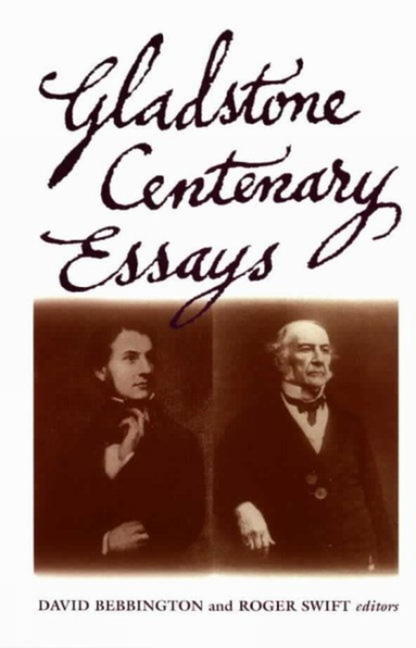Book contents
- Frontmatter
- Contents
- Contributors
- List of Illustrations
- Preface
- Acknowledgements
- Abbreviations
- Introduction
- Gladstone, Chalmers and the Disruption of the Church of Scotland
- ‘The Strict Line of Political Succession’? Gladstone's Relationship with Peel: An Apt Pupil?
- Gladstone and Homer
- Gladstone and Parliamentary Reform
- Gladstone, Liberalism and the Government of 1868–1874
- Gladstone and Cobden
- Networking through Sound Establishments: How Gladstone Could Make Dissenting Sense
- Gladstone and Irish Nationalism: Achievement and Reputation
- In the Front Rank of the Nation: Gladstone and the Unionists of Ireland, 1868–1893
- Exporting ‘Western & Beneficent Institutions’: Gladstone and Empire, 1880–1885
- Gladstone's Fourth Administration, 1892–1894
- ‘Carving the Last Few Columns out of the Gladstonian Quarry’: The Liberal Leaders and the Mantle of Gladstone, 1898–1929
- William Ewart Gladstone: A Select Bibliography
- Index
Introduction
- Frontmatter
- Contents
- Contributors
- List of Illustrations
- Preface
- Acknowledgements
- Abbreviations
- Introduction
- Gladstone, Chalmers and the Disruption of the Church of Scotland
- ‘The Strict Line of Political Succession’? Gladstone's Relationship with Peel: An Apt Pupil?
- Gladstone and Homer
- Gladstone and Parliamentary Reform
- Gladstone, Liberalism and the Government of 1868–1874
- Gladstone and Cobden
- Networking through Sound Establishments: How Gladstone Could Make Dissenting Sense
- Gladstone and Irish Nationalism: Achievement and Reputation
- In the Front Rank of the Nation: Gladstone and the Unionists of Ireland, 1868–1893
- Exporting ‘Western & Beneficent Institutions’: Gladstone and Empire, 1880–1885
- Gladstone's Fourth Administration, 1892–1894
- ‘Carving the Last Few Columns out of the Gladstonian Quarry’: The Liberal Leaders and the Mantle of Gladstone, 1898–1929
- William Ewart Gladstone: A Select Bibliography
- Index
Summary
The centenary of the death of W. E. Gladstone in 1998 was marked in several ways. On 18 May 1998, the eve of the precise anniversary, the University of Oxford, which he represented in parliament from 1847 to 1865, held a service of commemoration at the University Church of St Mary the Virgin. Lord Runcie, the former Archbishop of Canterbury, preached a sermon that soon appeared under the title ‘God's Politician’. On the following day a sequence of events took place at Westminster. An exhibition was opened in Westminster Hall by Lord Jenkins, recently Gladstone's biographer; evensong, incorporating Gladstone's own hymn ‘O Lead My Blindness by the Hand’, was sung in Westminster Abbey; wreaths were laid by junior members of the Gladstone family on the grave and by the statue in the abbey; and another was placed by the Speaker of the House of Commons on the spot where Gladstone's body had lain in state in Westminster Hall. A reception followed at the National Liberal Club. Church, state and university, the institutions that Gladstone served, had not forgotten him.
Nor had historians. From 5 to 8 July there was held at Chester College a Gladstone Centenary International Conference, attracting almost one hundred people. The occasion included visits to Hawarden Castle, Gladstone's home from 1851 onwards, and to St Deiniol's Library in the same village, the residential library that Gladstone established with the gift of the bulk of his own books. After the conference the annual Founder's Day gathering associated with the library took place: Lord Habgood, the former Archbishop of York, preached in Hawarden Church and Lord Jenkins delivered the Founder's Day address. Sir William Gladstone, the Prime Minister's great-grandson, was the after-dinner speaker during the conference. But the chief activity of the conference was listening to academic papers. Twenty-seven were given on various aspects of the statesman, the first being a public lecture by Professor Colin Matthew on ‘Gladstone: The Man through his Diaries’. Many of these papers are due to be published by St Deiniol's Library itself; others are collected in the present volume, published by the university press of the city where Gladstone was born. They represent some of the estimates of the statesman current among historians a century after his death.
- Type
- Chapter
- Information
- Gladstone Centenary Essays , pp. 1 - 9Publisher: Liverpool University PressPrint publication year: 2000



